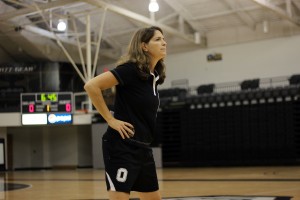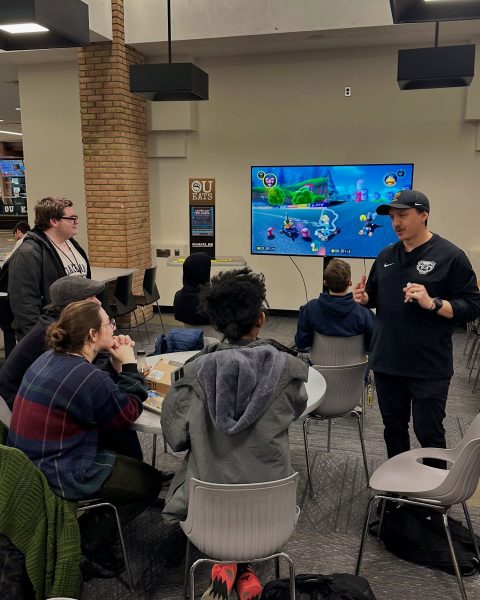Women’s head coach reveals abuse as child to raise awareness

For Beckie Francis, sharing her experience as a survivor of childhood sexual abuse was a way to encourage others and raise awareness about a topic that is often dismissed as taboo.
“It’s horrifying. It’s hard to say sometimes,” she said. “I remember the first couple of times I tried to say it, I’d just get this lump and start crying. It was the hardest thing I have ever done, but since breaking my silence, I am so happy. I have never been happier in my life.”
Until recently, Francis, who coaches Oakland University’s women’s basketball team, had not publically disclosed that she was sexually abused by her father from age four to 13. She had previously told her team and her church. On Oct. 18, Francis told the world through an interview with the Associated Press.
The decision
Francis was inspired to speak out by others who had done the same, including Sen. Scott Brown and advocate Erin Merryn. She was also prompted to come forward after increasing media reports of abuse at churches and schools, including the Jerry Sandusky scandal at Penn State.
“The very first time I decided to go public was when I was watching TV one night and Sen. Scott Brown was on, saying that he was abused by a camp counselor,” she said. “I said to my husband (University President Gary Russi), ‘Oh my gosh — he just won Ted Kennedy’s seat and he’s not afraid of what people think.’ It was a breaking moment for me. I had thought because I was the president’s wife and the basketball coach that I could never say anything because people would judge me.”
Inspiring others
Since breaking her silence, Francis said she has been supported and humbled by emails from people across the country who were inspired to share their own experiences with abuse.
Francis has won 184 Division I games over 10 seasons and led the team in its 2002 and 2006 NCAA tournament appearances, wants victims to know that they are not alone.
With the help of Center for Student Activities Director Jean Ann Miller, Francis coordinated an open dialogue event featuring Merryn earlier this month. Approximately 200 people attended, according to Miller.
Merryn, a survivor of abuse, is responsible for Erin’s Law, which was passed in the Michigan Senate in July and is pending approval from the House. The legislation requires age-appropriate curriculum to help children understand and discuss sexual abuse.
“It’s one of those topics that is shoved under the carpet—it’s not discussed,” Miller said. “We were looking for a proactive way to bring it to the forefront and allow our students to know what resources are available.”
The CSA hopes to host more awareness events about physical and mental health.
“People see it (abuse) on the news and in the movies,” Miller said. “It happens in real life, too. When you humanize such a touchy subject, it breaks down some barriers — it makes people think, ‘If this person can do it, maybe I can do it.’ Beckie is a perfect example of that, she’s absolutely a role model.”
Support on campus
Oakland has also taken a proactive approach within its administration. After the Sandusky scandal broke last year, a child protection committee was formed to assess campus safety.
“Oakland University has an obligation to protect everyone who comes onto our campus, whether they are children or adults,” Russi said. “The committee was established to make sure we have every possible safeguard in place, and that there are no gaps in our reporting and enforcement measures. The committee will continue to assess our procedures to ensure that we provide a safe environment.”
The OU Counseling Center, located in the Graham Health Center, also offers services to students in need. In addition to diagnostic testing, campus outreach programs and substance abuse awareness and evaluations, the Counseling Center offers up to six free therapy sessions to OU students. The services are completely confidential and students can set up an appointment by phone or in person.
“What a student talks about in here, stays in here,” said Dr. David Schwartz, the director of the OU Counseling Center. “We take confidentiality very seriously — without trust, the therapy process doesn’t work.”
Unaddressed issues can affect an individual’s life professionally, personally and academically, according to Schwartz.
“If you notice that emotions, thoughts or memories are starting to really be a problem, that’s your mind and body telling you to talk to somebody,” he said. “Everyone’s different, there’s no one way to deal with an issue.”
Schwartz also stressed the unbiased perspective a therapist offers.
“A lot of people think they can handle things on their own,” Schwartz said. “As human beings, we’re social creatures, we need to get other people’s perspectives. We can get caught up in our own patterns of thinking and it’s difficult to be able to step outside of ourselves and see how things might be affecting us. That’s where a therapist comes in.”
He said an advocate helps someone in a similar situation feel more comfortable disclosing their own experiences.
“By talking about their own stories, Beckie and Erin are giving courage to people to talk about it, too,” Schwartz said. “One of the big hindrances for something like abuse is there can be shame that goes along with it. A person might feel like they’re alone or they feel ashamed about the abuse. People are very good about blaming themselves even when it’s clear from everyone else’s perspective that they’re not at fault.”
The cost of silence
For Francis, who was honored as a 2010 Esteemed Woman of Michigan, speaking out was a part of her personal healing process. Denying abuse can lead to mental and physical stresses, according to Francis.
“If you don’t break your silence, it goes to other things,” Francis said. “People get sick, they drink, they become promiscuous, they do all kinds of harmful things. They (victims) think, ‘Oh, I’ll just get over it,” and they don’t know why they’re stressed out. They don’t know why they have panic attacks and anxiety. They don’t know why they’re not happy. They don’t realize it, but they’re in pain.”
The coach resigned after the 2002 basketball season because of ulcerative colitis she later attributed to stress from the abuse and denial; she was rehired in 2005. During her sabbatical, Francis said she found solace in therapy and religion.
“I’ve had so much spiritual healing. That’s the reason I can be so comfortable in my own skin and I was able to release the pain and deal with it — I have a faith,” she said. “I do not believe that you can totally recover from something like this without having a higher power that you can lean on.”
Since breaking her silence, Francis said she has been happier and healthier. She encourages others to allow themselves the same.
“I’m so healed through my faith and through my therapy that it is not embarrassing,” she said. “I’m not ashamed, I don’t feel guilty anymore. I want others to know that they can seek help and that there are resources for them.”






